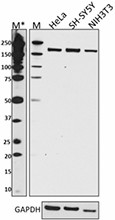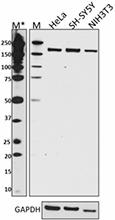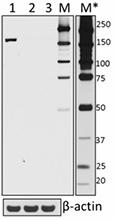- Clone
- W16104A (See other available formats)
- Regulatory Status
- RUO
- Other Names
- Tuberin, Tuberous sclerosis 2 protein, TSC4
- Isotype
- Rat IgG2a, κ
- Ave. Rating
- Submit a Review
- Product Citations
- publications

-

Total lysates (15µg protein) from HeLa, Jurkat and NIH3T3 cells were resolved by electrophoresis (4-12% Bis-Tris gel), transferred to nitrocellulose, and probed with purified anti-TSC2 antibody (clone W16104A, 2µg/ml) (upper) or GAPDH (poly6314) antibody (lower). Proteins were visualized using an HRP goat anti-rat-IgG secondary antibody for TSC2 or HRP Donkey anti-rabbit IgG Antibody for GAPDH and chemiluminescence detection. Lane M is the molecular weight ladder and M* indicates extended exposure of the molecular weight ladder. -

Total lysates (15µg protein) from HeLa (Lane 1), 5nM (Lane 2)and 20nM (Lane 3) TSC2 siRNA treated HeLa cells were resolved by electrophoresis, transferred to nitrocellulose, and probed with purified 1µg/mL anti-TSC2 antibody (upper). Proteins were visualized using an HRP goat anti-rat-IgG secondary antibody and chemiluminescence detection. Direct-Blot™ HRP anti-β-actin Antibody was used as a loading control (lower).
| Cat # | Size | Price | Save |
|---|---|---|---|
| 697701 | 25 µg | ¥22,220 | |
| 697702 | 100 µg | ¥55,660 |
Tuberous sclerosis 2 (TSC2) forms the tuberous sclerosis complex with TSC1 and functions as a crucial negative regulator of the Rheb/mTOR pathway. mTOR belongs to the PI3K-related kinase family and regulates protein translation, cell proliferation, and cell differentiation. Activation of mTOR requires binding to the active small GTPase Ras homolog enriched in brain (Rheb). TSC2 acts as a GTPase activating protein (GAP) and inhibits mTORC1 through converting active GTP-bound Rheb to inactive GDP-bound Rheb. Phosphorylation of TSC2 by AKT leads to inactivation of the tuberous sclerosis complex and in turn results in the activation of the Rheb/mTOR pathway. Mutations in the TSC2 gene lead to hyperactivation of the Rheb/mTOR pathway and are associated with the autosomal dominant disorder tuberous sclerosis and pulmonary lymphangioleiomyomatosis (LAM).
Product DetailsProduct Details
- Verified Reactivity
- Human, Mouse
- Antibody Type
- Monoclonal
- Host Species
- Rat
- Immunogen
- Human TSC2 recombinant protein (1508-1807 amino acid) expressed in E. coli.
- Formulation
- Phosphate-buffered solution, pH 7.2, containing 0.09% sodium azide.
- Preparation
- The antibody was purified by affinity chromatography.
- Concentration
- 0.5 mg/ml
- Storage & Handling
- The antibody solution should be stored undiluted between 2°C and 8°C.
- Application
-
WB - Quality tested
KO/KD-WB - Verified - Recommended Usage
-
Each lot of this antibody is quality control tested by Western blotting. For Western blotting, the suggested use of this reagent is 0.2 - 2.0 µg per ml. It is recommended that the reagent be titrated for optimal performance for each application.
- Application Notes
-
This clone does not work for IF application (in house tested).
Antibody specificity was confirmed by knock-down of TSC2 using siRNA (in-house tested). - RRID
-
AB_2687188 (BioLegend Cat. No. 697701)
AB_2687188 (BioLegend Cat. No. 697702)
Antigen Details
- Structure
- 1807 amino acids with a predicted molecular weight of 200 kD. Contains a Rap-GAP domain responsible for converting GTP-bound Rheb to its GDP-bound form.
- Distribution
-
Cytoplasm. Membrane.
- Function
- TSC2 is a GTPase activating protein (GAP) and acts as a negative regulator of the Rheb/mTOR pathway.
- Interaction
- Interacts with TSC1, HERC1, HSPA1, HSPA8, DAPK1, FBXW5, NAA10, and RRAGA.
- Biology Area
- Cell Biology, Signal Transduction
- Antigen References
-
1. Hobbs RM, et al. 2015. EMBO Rep. 16:467.
2. Demetriades C, et al. 2014. Cell. 156:786.
3. Tripathi DN, et al. 2013. Proc. Natl. Acad. Sci. USA. 110:E2950.
4. Han JM, et al. 2011. FEBS Lett. 585:973.
5. Huang J, et al. 2008. Biochem J. 412:179.
6. Li Y, et al. 2004. Trends Biochem Sci. 29:32. - Gene ID
- 7249 View all products for this Gene ID
- UniProt
- View information about TSC2 on UniProt.org
Other Formats
View All TSC2 Reagents Request Custom Conjugation| Description | Clone | Applications |
|---|---|---|
| Purified anti-TSC2 | W16104A | WB,KO/KD-WB |
Compare Data Across All Formats
This data display is provided for general comparisons between formats.
Your actual data may vary due to variations in samples, target cells, instruments and their settings, staining conditions, and other factors.
If you need assistance with selecting the best format contact our expert technical support team.









Follow Us